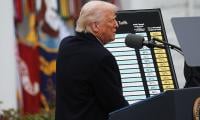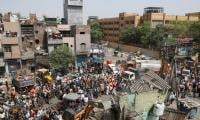fake passport mentioned the place of birth as Mandya. After details of Rajan’s arrest started pouring in, the Mandya police launched an inquiry and pulled out details of all those who applied for passports in 2008, as Rajan’s passport is said to have been issued on July 8 that year. The police found that no one by name Mohan Kumar, the alias used by Rajan, had applied for passport in 2008 and no police verification was done.”
Following are some contradictory statements issued by senior Indian security officials; just days before Chhota Rajan was flown back to India:
The Deccan Chronicle had quoted the Mandya District SP Bhushan Borse as saying: “There has been no official communication so far. But we verified the records and no one by name Mohan Kumar applied for a passport that year.”
Interestingly, another senior police officer quoted in the same story had viewed: “As the residential address is not known, we did not have to verify it. But we did not want to take any chances.”
Director General and Inspector General of Police, Om Prakash, said: “As there is no clarity on the residential address, we cannot come to any conclusion. The case pertains to Mumbai and the agency will look into these issues only after starting the probe. We have nothing to clarify now.”
Regional Passport Officer Karthigeyan had maintained: “As per details, the said passport was issued at the Consulate General of India, Sydney. We have no information on previous passports and police verification, if any.”
In India, Rajan faces more than 80 criminal cases including around 20 murders.
The Hindustan Times reports: “Bullet-proof car, crack commandos — the security for crime boss Chhota Rajan on his arrival in Delhi on Friday morning was unprecedented, with the Central Bureau of Investigation (CBI) apprehending threat to his life from rivals including the Dawood Ibrahim gang. Soon after he arrived from Indonesia in a chartered aircraft, the security team whisked away Rajan from Palam‘s air force station to the CBI’s headquarters in south Delhi in a bulletproof car.”
The prominent Indian newspaper adds: “The team used secrecy and deception to transport the ‘high-value’ accused, who faces more than 80 criminal cases including around 20 murders. A source in the special cell told Hindustan Times that immediately after de-boarding the aircraft, a visibly emotional Rajan knelt down at the tarmac and kissed the ground. Rajan had fled the country for Dubai in 1988 to escape the law after allegedly committing several crimes including murders. Indian law agencies caught up with him after 27 years, however.”
Research conducted by the “Jang Group and Geo Television Network” shows that an August 8, 2005 WikiLeaks cable titled “Terrorist Dawood Ibrahim haunts India from after as daughter weds in an American-branded hotel” had stated that in July 2005, Ibrahim’s daughter had married the son of a former Pakistani cricketer.
WikiLeaks mentioned: “Like a bad dream, terrorist and underworld figure Dawood Ibrahim returned to the headlines of India’s media in July when his daughter married the son of a Pakistani cricket player. An upscale wedding reception brazenly took place at the ostensibly American-run Grand Hyatt Hotel in Dubai on July 23.”
The WikiLeaks cable had revealed: “The couple had reportedly met while they both were studying in London. A reception attended by about 250 people was held on July 23 at the Grand Hyatt Hotel in Dubai, UAE. A sizeable media contingent from India staked out the hotel, but was prevented by the organisers and their tough private security firms from filming the event or even getting close to the hotel ballroom where it took place. Ibrahim reportedly did not attend. Any public appearance would have likely led to his immediate arrest, since Interpol had earlier issued a “red corner” notice against him.
It added: “After the Dubai reception, the Times of India reported that Ibrahim had earlier traveled incognito to Makkah for the July 9 nikah, the solemnization of the marriage. The newspaper claimed that Ibrahim entered Saudi Arabia with a false identity. The media speculated that Ibrahim purposely fueled the media hype about his attendance in the Dubai reception in order to draw attention away from the more important objective of attending the nikah in Makkah. Indian police officials remained tight-lipped about the newspaper’s report, and like so much of the media coverage of Ibrahim, the “Times” did not follow up and the story was dropped quickly.”
The WikiLeaks cable further states: “The wedding and subsequent reception had generated intense interest in the Indian media, which reported that Indian police and security services were shadowing business, entertainment and underworld figures from India who might try to attend the reception. In the end, no prominent Indians actually showed up in Dubai. The manner in which Ibrahim could so blatantly stage such an event has infuriated our Indian contacts.”
WikiLeaks had also mentioned the name of Ajit Kumar Doval, former head of the Indian Intelligence Bureau and the current National Security Advisor to Prime Minister Narendra Modi since May 2014.
WikiLeaks had written: “In early July (2005) a group of Mumbai policemen traveled to Delhi to stake out Vicky Malhotra, an underworld figure who had been charged with numerous crimes, including murder, extortion and arms smuggling. On July 11 the Mumbai police arrested Malhotra while he was driving through central Delhi. Accompanying Malhotra was Ajit Kumar Doval, former head of the Indian Intelligence Bureau. Doval was allowed to go free, whereas Malhotra and two associates who were picked up later were taken to Mumbai where they now face criminal charges. Doval, himself as well as government of India officials from the Home Ministry, later declined to comment about the incident.”
A few blogs and articles appearing on internet have said that Ajit Kumar Doval is believed to be the brains behind Chhota Rajan’s arrest too, since has been trailing the don and his henchmen to get leaks on Dawood Ibrahim’s D-Company and its activities for years.
A few years ago, Indian media reports had pointed out that Doval worked out a plan for the Intelligence Bureau to send Vicky Malhotra, a sharp shooter from Rajan gang, to target Dawood at his daughter’s wedding in Dubai.
Before his retirement, Doval had spent six years in Indian High Commission in Islamabad, had responded to the 2008 Mumbai attacks in February 2014 by saying “You do one more Mumbai, you may lose Balochistan.” He had expressed these views at a seminar on the “Strategic Response to Terrorism” at an Indian university, before being appointed as the Indian National Security Advisor.
Rajan and his wife Sujata have three daughters - Anita Nikhalje, Mala Nikhalje and Pallavi Nikhalje.
His brother Deepak Nikhalje stole the limelight when he was found sharing dais with the would-be Indian Premier Narendra Modi in one of the pre-election rallies in Mumbai in 2014.
An Indian journalist, Baljeet Parmar, who has covered the Mumbai underworld for more than 40 years and had seen the rise and fall of Chhota Rajan for 29 years, writes: “By 1985, the city was in the grips of an ugly gang war between Dawood Ibrahim and the Pathan gang led by Karim Lala. Chhota Rajan smelled an opportunity to strike it big by supplying hired killers to Dawood and his company. By 1988, when notorious gangster Ashok Joshi of the Arun Gawli gang was brutally murdered in the outskirts of Mumbai, Chhota Rajan had become a name to be reckoned with in Mumbai’s underworld.”
Baljeet writes: “Towards the end of 1988, the Pathan gang and Dawood came to a settlement. This development eroded Chhota Rajan’s clout within the D-Company, as the outfit came to be known, since Dawood no longer needed Chhota’s help in dealing with the Pathans. Rajan escaped several attempts on his life but was finally shot at and injured in 2000 at Bangkok. Rajan went on changing his hideouts, always living in the shadow of death. All these years, Rajan remained in close touch with the Indian intelligence agencies, providing them information and clues on the D-Company. The Indian agencies reciprocated by informing Rajan about imminent risks to his life.”
Meanwhile, archives of the Times of India, NDTV, Zee TV, the Statesman, the Press Trust of India, the Hindu, the Hindustan Times and Rediff.com etc reveal that after the 1993 Mumbai blasts, following the December 1992 demolition of the Babri Masjid, Rajan had openly claimed himself to be Hindu don and had won accolades from fascist Indian political parties like the Shiv Sena as the distrust between the Hindu and Muslim communities had widened further.
Dawood was named as one of the main accused in the 1993 Mumbai blasts.
Chhota Rajan parted company with Dawood, citing religious reasons, and took a flight to Bangkok. Rajan had survived a bid on his life in September 2000, when Dawood’s key aide Chhota Shakeel opened fire at him in Bangkok.







